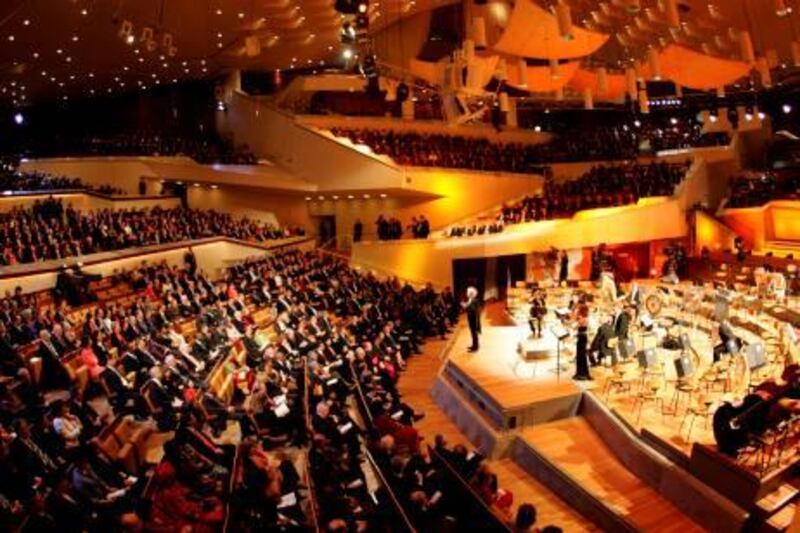How do you get the best out of the world's greatest orchestra? This is the daunting question Simon Rattle grapples with every day. As the head of the Berlin Philharmonic, the 55-year-old British conductor has been in classical music's most-respected, most-exposed position for 12 years now, and tonight brings the orchestra to perform in the UAE for the first time as part of the Abu Dhabi Classics series. Talking to him about this remarkable and famously independent ensemble, he makes them sound like a force of nature:
"They're one of the wildest orchestras out there. They're like birds in flight - they change at a flicker without anyone knowing quite why. They have an unbelievable physical commitment and they play very intensely, with every night as if it were their last concert on earth. They have to be able to fly - and fly they do!"
In some ways, Rattle could be describing himself. A charming, charismatic man, his expressive conducting (as well as his trademark mop of shaggy grey curls) has made him one of classical music's most-recognised figures. Well known for expanding the conventional orchestral repertoire well into the 20th century, Rattle has also been instrumental in getting the Berlin Philharmonic out of its concert hall base in the German capital as much as possible. Performing in aircraft hangars and factories, working with schoolchildren and prisoners and touring to new cities around the world, under Rattle the Berlin Phil has become one of Europe's most extroverted orchestras.
Does Rattle perhaps find the traditional European concert hall limiting?
"Not at all - having the Philharmonie (their home base) is like having an instrument, a wonderful violin, to work with. But there are many other places music can work, and what we do is just too important to be kept for one audience. What's fascinating as we tour is the different ways in which people listen in different places. Seeing what happens in Abu Dhabi is going to be very interesting, very exciting indeed."
Interesting it certainly will be. While Rattle has chosen two beautiful stalwarts of the repertoire to perform - Haydn's 99th and Brahms' second symphonies - he has matched them with music by the 20th-century modernist Alban Berg and the contemporary Australian composer Brett Dean, both composers who are almost never performed in the Middle East. While this breaks new ground, Rattle seems confident of a positive response.
"We wanted to bring a real selection of what we play - a big romantic masterpiece and a classical piece, but also this extraordinary score written on the eve of the First World War. We're also delighted to be playing a piece by a former Berlin Philharmonic member, Brett Dean, a good personal friend of mine. The programme is a mix of the old and new - we find that in newer cities, like Shanghai where we recently played, everything is so new that it doesn't really matter if the music was written yesterday or 200 years ago."
While the orchestra has been moving around like never before, Rattle has also broken ground by having concerts streamed live online - with excellent sound and image quality - via the Berlin Philharmonic's new Digital Concert Hall. As Rattle tells me, discovering new audiences this way has at times been surprisingly moving.
"After the concert we broadcast on Friday (of Rachmaninov's Symphonic Dance's and Mahler's First Symphony) we were sent a photo by a fan who lives in the middle of nowhere on an Indian reservation in Minnesota. They'd set up a bedsheet outside and used it as a screen for a projector - everyone had come along to watch the concert. We were so moved! This means absolutely everything to us!"
Shanghai, Abu Dhabi and Minnesota all seem quite a long way from Rattle's roots in suburban Liverpool. A businessman's son growing up just round the corner from The Beatles' families in Penny Lane, Rattle's background isn't entirely obvious for a classical musician, though he links his later career path to his family's musically omnivorous tastes.
"I grew up in a house that was full of different kinds of music. My father had a professional jazz band, while my mother ran a record shop at one time. Liverpool in the 1960s was very alive, a very artistic place to be, and good music was hard to avoid. Anyway, looking around the Berlin Philharmonic, I've asked myself how many people do actually come from a so-called classical music background? Maybe a handful. Classical musicians pop up unexpectedly like truffles, you never know where. Ask any musician and they almost always say they were the strangest people in the class. But for almost everybody, that unusual beginning is absolutely the natural thing."
Showing musical talent from a young age, Rattle started his professional life as the assistant conductor at the Bournemouth Symphony Orchestra at only 19. Tipped early on as a great future hope for Europe's classical music scene, he took over as the principal conductor of the City of Birmingham Symphony Orchestra at the equally improbable age of 25. Many expected his tenure to be just a brief stepping stone en route to heading a better-known ensemble, but they were proved wrong. Rattle, in fact, stayed in Birmingham for 18 years, steadily transforming a provincial player into one of Europe's major names, gaining them a reputation as fine interpreters of late romantics such as Mahler and wangling them a new concert hall to boot. Despite complementing his work in Birmingham with guest conductor spots with major orchestras elsewhere - he first conducted the Berlin Phil in 1987 - many wondered why he chose to stay so long. As Rattle explains: "Leading an orchestra is like a marriage. The most wonderful things don't happen overnight -often these things take time. They need slow, steady building."
In the end, his long tenure in Birmingham boosted his reputation, gaining new respect for Britain's classical music scene and marking Rattle as someone with staying power and mettle. This tenacious, steady development of a personal rapport with musicians is something Rattle has continued to explore in his role with the Berlin Phil, about which he is disarmingly modest.
"My role is to find a way to harness that energy, not to control it. Normally, you have to encourage them, but here in Berlin they come in like wild tigers. You have to civilise the playing, guide it sometimes, it's like swimming in a very powerful current. If you don't change the way you conduct with each orchestra, you've lost the plot, but physically, I am more relaxed here because the orchestra do so much themselves."
As a British conductor working at the heart of the Central European tradition, Rattle cuts something of an unusual position. Still not quite a Berliner, his German remains expressive but eccentric, and the occasional butt of jokes from his son Jonas (by his third wife, the Czech soprano Magdalena Kožená).
"My five-year-old son is trilingual in German, English and Czech, and he said to me recently: 'You know, dad, it's funny, when you speak German you know exactly what you're saying, but nobody understands you'."
The orchestra understand him very well, he insists, but - he laughs: "They tell me to 'keep the jokes in English'."
Despite this relative outsider position (though Rattle is adamant about Britain being more European than it likes to think), his partnership with the Berlin Philharmonic has proved to be very fertile, pushing the orchestra in new directions musically while still celebrating its characteristic broad sound. You'd need to be deaf and blind not to be moved by the incredible beauty of a Berlin Philharmonic performance - by the subtlety and emotional expressiveness of their playing. But given that they have recorded so widely, and are now viewable live online, what can concertgoers gain from seeing the orchestra live in Abu Dhabi?
"It's like the difference between real friends and virtual friends - it's great having online friends but it's not exactly the same. The real truth about music is that it's made from people to other people in the same space, the real essence only happens right there in the room. Every concert is a contract between audience and musicians, and the audience's concentration is as important a factor as what the musicians do. So you could say a concert is like a real kiss. After all, relationships work best between people who are in the same room."
For more information on Abu Dhabi Classics, visit www.abudhabiclassics.com





